Let's be realistic: trying to extract data using manual methods is just a waste of time. One of the best ways to scrape it is making use of data extraction tools since they save you time and effort, and it's more efficient than copying and pasting. 😀
There are tons of tools for data extraction, varying in functionality and cost: APIs, cloud-based or open-source. Here are the 10 best data extraction tools we found:
| Extraction Tool | Easy | Features | Best for | Tool Type | Price |
|---|---|---|---|---|---|
| ZenRows | ✅ | Antibot, anti-CAPTCHA, premium smart proxies, geotargeting, JS rendering | Developers | Web scraping API | 1k requests for free, then plans from $49/month |
| Import.io | ✅ | Data analytics software integrations, price tracking | Marketers, data analytics | Cloud-based | 30 days free trial, with plans starting from $299/month |
| Mozenda | - | Unlimited robots, Microsoft Office integrations | Marketers | Cloud-based, downloadable for Windows | 30 days trial, then contact sales to get a quote |
| Octoparse | - | IP rotation, anti-CAPTCHA, API access, 100 pre-set task templates | Marketers, web analytics, developers | Cloud-based, downloadable for Windows and Mac | 14 days trial, direct demo access, plans starting from $89/month |
| Parsehub | - | IP rotation, Tableau integration | Market researchers, data analytics | Cloud-based, downloadable for Windows and Mac | 5 projects with 200 pages per run, plans from $189/month |
| ScraperAPI | ✅ | Antibot, proxies, JS rendering | Developers | Web-scraping API | 1000 API credits free, plans start $49/month |
| Apify | ✅ | Web scraping pre-sets, rotating proxies, team access | Developers, data analytics | Cloud-based, downloadable for Windows and Mac | $5 credits and 30-day proxy trial, console access upon signing up, plans from $49/month |
| Bright Data | - | Rotating proxies, SERP API, datasets | Marketers, web analytics | Cloud-based, downloadable for Windows and Mac | Up to 1-week trial, demo access only after contacting sales, plans from $500/month |
| Diffbot | - | AI-powered data extraction tool, JS rendering, mobile app, datasets and integrations | Marketers, web analytics | Cloud-based, downloadable for Windows and Mac, has applications for iOS and Android | 14 days trial, immediate dashboard access, plans from $299/month |
| OutWit Hub | - | Data harvesting tool, has pre-sets, allows creating a custom scraper | Developers, data analytics | Cloud-based, downloadable for Windows | Limited version is free to download, plans start from 95€/month + VAT |
Let's get into the details now and discuss these tools, as well as some data extraction basics.
What Is Data extraction?
Data extraction is the process of retrieving data from one or more online sources for further processing and analysis. An example of this can be scraping the product names and prices of the best sellers on Amazon for market research.
Why Is Data Extraction Important?
Companies use data extraction to access data stored in various formats outside the company's premises. This data can be used for purposes of marketing, business analytics, research, informed decision-making and so on. Some of the use cases worth mentioning include:
- In SEO, data extractors collect lists of competitors' backlinks and keywords.
- Data extraction is often used in sales departments to create prospect lists.
- E-commerce relies on web data extraction tools to track trends, new stock items, emerging categories and products, create price graphs and more.
How Is Data Extracted?
In the data extraction process, a script or tool is used to extract relevant data from a source, which can then be saved in different formats, such as CSV, HTML, JSON and so on. These data are usually structured, semi-structured or unstructured.
Techniques of Data Extraction
There are different techniques used to extract data from online sources. The most common methods are physical and logical extraction.
Physical data extraction is used to extract information from obsolete sources. It works by creating a carbon replica of the original source and extracting the data, removing the need to link to the original source.
Logical extraction allows extracting data from sources that constantly change or update. A data engineer programs incremental extraction to discover all changes and mark them with a timestamp. If the source is static and doesn't change over time, full extraction allows operating with all data at once, even with massive volumes.
What Is a Data Extraction Tool?
Data extraction tools are programs that automatically gather and copy web data. In almost every industry, businesses and organizations will eventually need to extract data for different use cases.
However, web data extraction tools are not just simple programs that bulk-copy information since they have to be powerful to crawl multiple sources, and they need to be smart to mimic a human-like behavior in order to extract data without getting blocked.
Why Use a Data Extraction Tool?
Manual online data extraction is useless when it comes to large-scale extraction. Moreover, automation helps set strict algorithms and avoid ambiguity. These are the advantages of using an extraction tool over manual operations:
- It's much more accurate compared to manual methods.
- Reduces costs associated with manual data entry.
- It gives control over the data being extracted.
- Using a data extraction tool helps save time during the extraction process.
Types of Data Extraction Tools
Web Scraping APIs
A web scraping API is a batch-processing tool that gets data in volumes and parses web pages of all complexity. This type of tool for data extraction allows extracting information via API and scheduling queries for real-time updates. Examples of these extraction tools are ZenRows, Scraperbox and Apify.
Open-Source Tools
Open-source data extraction tools are free programs that can be downloaded and used with no need to buy a license. They're especially helpful when you have a limited budget or when your tasks are occasional. Although the software is free, you often need a technical understanding. Talend Open Studio is an example of an open-source data extraction tool.
Cloud-Based Tools
Cloud-based data extraction tools are often paid programs that store data in a cloud. They handle the extraction logic without coding or data engineering knowledge, and the scraped data can be stored in a cloud server, making it possible for your team members to access it at all times. Examples of cloud-based data extraction tools are Parsehub and Mozenda.
Datasets
Why run the extraction from scratch if your data source is popular? Instead of paying for data harvesting, buy a ready-to-use dataset. You can find some low-budget ones with access to Google Maps, Yellow Pages and other well-known sites. And it already comes clean and structured.
Top Data Extraction Tools in 2022
We tested and researched some of the popular tools for data extraction, and here are the best ones we were able to find:
1. ZenRows
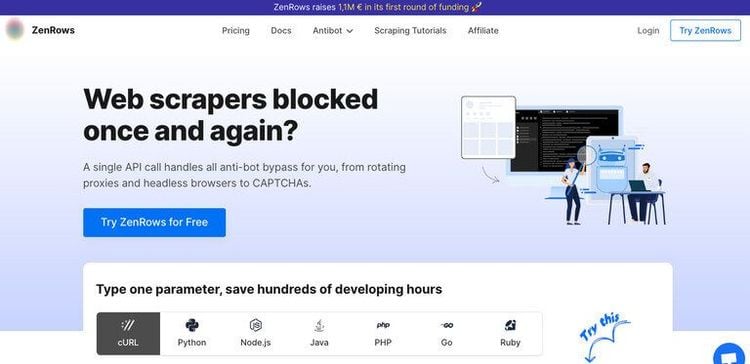
ZenRows is a web scraping API for extracting data. It integrates seamlessly with any language and library and is capable of getting the data from any web page without getting blocked due to features like smart rotating proxies, CAPTCHA bypass, headless browsers and so on.
You can get started for free and get 1000 API credits, then plans start as low as $49/month.
👍 Pros:
- Great for advanced web scraping.
- Built-in anti-bot and CAPTCHA bypass.
- It handles advanced requests, like headless browsing and geotargeting.
- Failed requests are free.
👎 Cons:
- It doesn't come with automated integrations for extracted data.
- Some programming skills are required.
2. Import.io
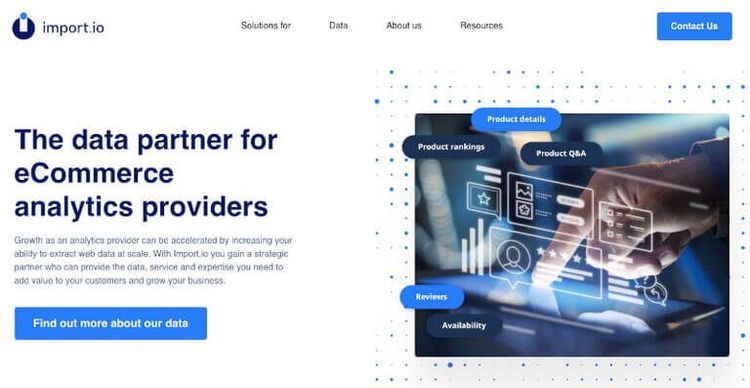
Import.io is a web-based data mining tool that creates a replica of the source webpage and allows further manipulation. It also provides integration with other applications, like BI tools. Import.io is expensive compared to other extraction tools, and its monthly price starts at $299.
👍 Pros:
- Easy to use.
- Perfect for exporting e-commerce data.
- Seamless integration with data analytics software.
👎 Cons:
- Expensive price plans.
- Accessing the demo is only possible with direct contact with the sales department.
- Idle periods are charged.
- It can't export dynamically-generated content.
- Not the best extraction tool for unstructured data.
3. Mozenda
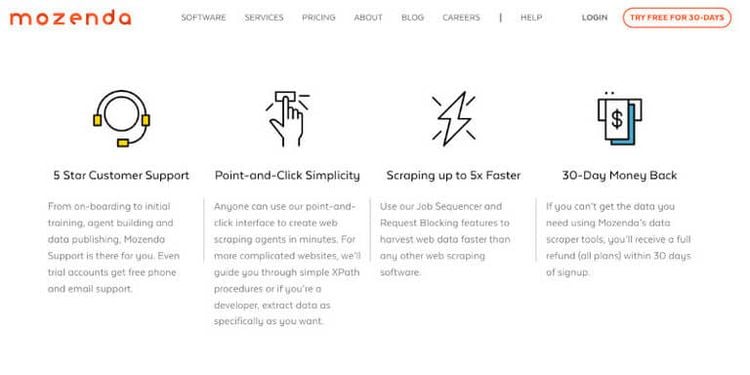
Mozenda is a scalable web data extraction tool perfect to scrape text, files, images and PDF content from web pages. Some of its features include data integration, wrangling and the ability to export data in various formats, like CSV, XML and JSON. Mozenda offers an elastic pricing structure that depends on the number of sites, number of records and frequency.
👍 Pros:
- A no-coding environment.
- 30 days trial for all users.
- Managed services are included in the Corporate and Enterprise plans.
- An option for the on-premise license is available.
👎 Cons:
- Pricing policies are unclear, and the trial is accessed by inquiry only.
- It doesn't support bulk queries.
- The subscription-based access can put limitations on testing.
- The documentation is fragmental and tangled.
4. Octoparse
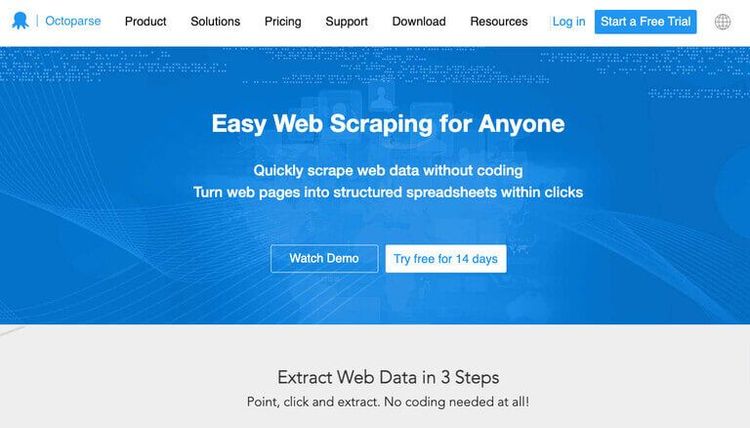
Octoparse is a downloadable visual web data extraction tool that comes with hundreds of templates for website scraping, like Yahoo Japan and OpenSea. It has a toolbox that provides custom structurization, auto-exports and other actions. Paid plans start at $89 per month.
👍 Pros:
- All-in-one web scraping and structuring software.
- Provided IP rotation to avoid blocking.
- Tutorials are extensive and user-friendly.
👎 Cons:
- It works best for a small query load.
- Only two active simultaneous tasks are available for a free plan.
- Requests take a longer time to process.
- Cloud-based web scraping comes only for paid plans. The free option runs on your local machine with zero proxy credits.
5. ParseHub
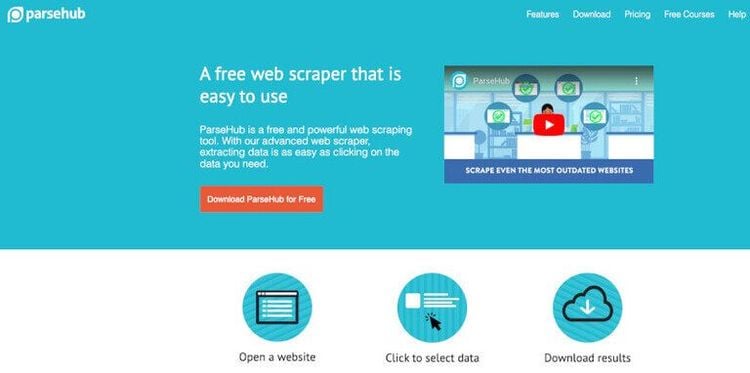
ParseHub is a cloud-based web scraping software that is capable of scraping outdated websites and databases. Its users can create scheduled runs, handle dynamic pages and access their data via API, Google Sheets and Tableau. It's designed for analysts, data scientists and market researchers. ParseHub plans cost between $0-600 per month and the extraction speed depends on the plan.
👍 Pros:
- Free plan with a limit of 5 projects.
- Suitable for lead extraction and basic web scraping.
👎 Cons:
- The standard subscription plan is almost 3 times more expensive than the competitors'.
- Parser set-up can be time-consuming.
- Not the most powerful tool for background extraction.
6. ScraperAPI
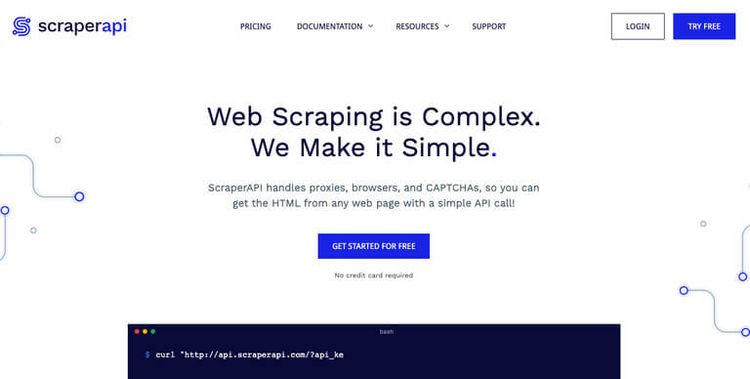
ScraperAPI helps with scraping beyond the basics, and it's equipped with relevant features like anti-bot and JS rendering. You can't start using it without launching the command in the console and its plans start at $49 per month.
👍 Pros:
- Built-in proxy rotation and bypass.
- Friendly developer-oriented UI.
👎 Cons:
- Only USA and EU geotargeting are available for cheaper plans.
- Non-developers won't be able to test the website data extraction tool.
7. Apify
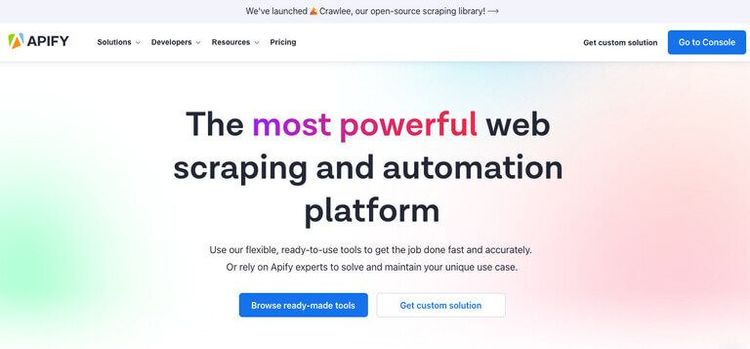
Apify is a one-stop shop for ready-made tools for data extraction. Most of the frameworks listed are free and some come at a modest monthly cost. The pricing starts as low as $0 per month and can go as high as $499 depending on team size.
👍 Pros:
- Community-based software.
- Teams get access to some data in the free plan.
- A calculator helps you figure out the estimated costs of your task beforehand.
👎 Cons:
- The number of credits included in the plans is low.
- Residential proxies are available only in the Enterprise plan.
- Some trial features can't be tested without a credit card.
8. Bright Data
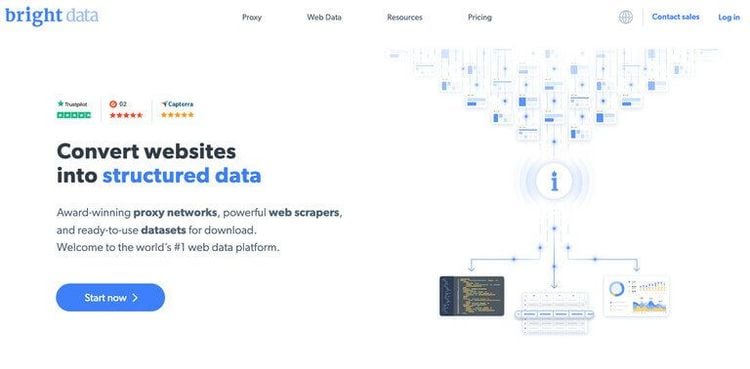
Formerly known as Luminati, Bright Data is one of the most well-known solutions for web scraping. It provides residential IPs and also offers access to datasets for e-commerce and business directories. The service is expensive, starting at $500 per month.
👍 Pros:
- High network uptime thanks to a combination of proxies.
- Good for geotargeting.
- The pay-per-use plan is offered aside from monthly commitments.
👎 Cons:
- The bandwidth is metered, while some competitors offer unlimited bandwidth.
- Documentation could be more intuitive.
- The trial account remains suspended until credits are refilled.
- You need to add and verify a credit/debit card.
9. Diffbot
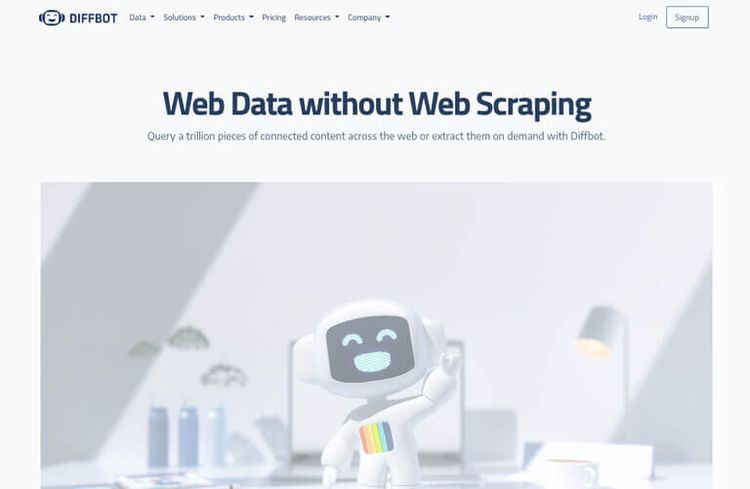
Diffbot is a data extractor based on AI with an extensive dataset called Knowledge Graph, which is a source for initial market research, quotability or statistics. The free version is limited to 10,000 credits and the paid plans start at $299 monthly.
👍 Pros:
- AI-based data extractor.
- Supported JS rendering.
- It has a mobile application.
- Access to the Knowledge Graph.
👎 Cons:
- High monthly subscription costs for heavy-loaded scraping.
- Many jobs are returned without a successful result.
10. OutWit Hub
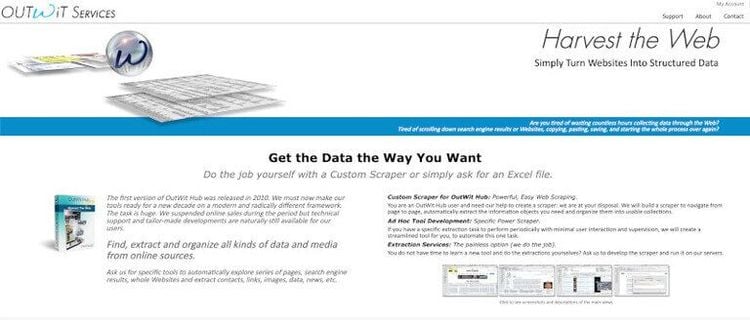
OutWit Hub is a free tool for data extraction that hasn't changed much since its first edition in 2010. It's often used for data journalism, contact extraction or classified ads extraction. The core program is free, but unlimited extractions and powered features are available only for paid plans starting at €95.
👍 Pros:
- It handles unstructured or obsolete data.
- It can be used to create custom scrapers.
👎 Cons:
- Outdated in comparison with competitors.
- Some technical knowledge is required.
- It doesn't provide smart proxies or anti-bot bypass.
What Data Extraction Tool Do You Need?
The best data extraction tool for your project depends on multiple inputs, but defining the software type, volume and complexity of the data to be extracted can help you narrow your options.
If you need a great all-in-one tool that can scrape any type of website, then you should consider ZenRows since it comes with the best antibot bypass in the industry.
Did you find the content helpful? Spread the word and share it on Twitter, or LinkedIn.